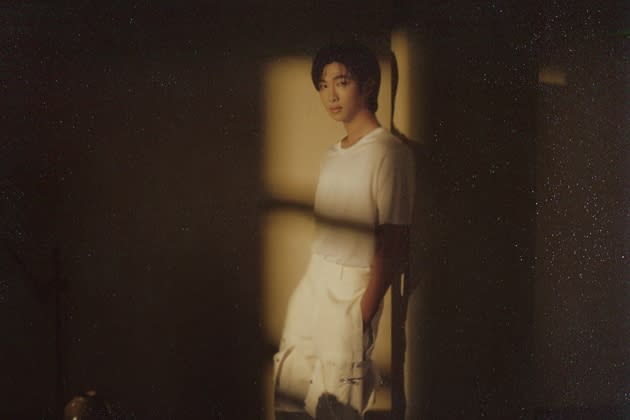BTS Leader RM Pushes Against the Weight of Fame, Looks Towards a Bright Future on ‘Indigo’

Heavy is the head that wears the crown. RM, the leader of BTS, seems to know this truth all too well. As the seven-member group skyrocketed to the world stage, the 28-year-old singer, songwriter, and producer found himself becoming not only as his band’s de facto spokesperson due to his English fluency, but also an ambassador for his home country of South Korea and Asians across the diaspora. Though praised for his moving speeches at the United Nations General Assembly (thrice!) and the White House, he’s spoken about the mounting pressures of having to represent the opinions of others.
“I debuted as a singer and happened to take on a responsibility in society, and even the world,” he said in June, when the band announced that they would be pausing group promotions. “In a way, we might not even be qualified for all those things.”
More from Rolling Stone
Coi Leray, RM, Metallica and All the Songs You Need to Know This Week
RM Takes Center Stage in Seoul During Solo NPR 'Tiny Desk (Home) Concert'
BTS Will Get 'Candid' in New Docuseries 'BTS Monuments: Beyond the Stars'
On his debut solo album Indigo, the artist born Kim Namjoon reclaims his pen, finally unrestricted from the obligation to be anything but himself. Though he compares his life to a painting “on constant display” on the upbeat hip-hop track “Still Life,” he raps of dashing forward on his own terms, liberated from the regrets of yesterday and expectations of tomorrow. “Ya can’t lock me in the frame, I’m moving,” collaborator Anderson .Paak sings in the hook, accompanied by jazzy horn blasts. Created with this reinstated self-commitment, Indigo is an adventurous sonic portrait of RM’s inner world, the work of an artist who finds his voice by bringing together the influences that resonate with his soul.
Longing for a time before the pressures of capitalist art-making, RM raps about getting back in touch with his younger self on album opener “Yun.” “I wanna be a human, before I do some art,” he raps with determination over a dusty boom-bap beat, after Erykah Badu offers her sagacious vocals about the importance of silence. The song’s hook is a reinterpretation of advice from the late South Korean painter Yun Hyong-keun, whose voice was sampled for the track, and is known for his monochrome paintings that combined Korean traditional ink calligraphy with Western abstraction.
In similar fashion, on “Yun,” RM synthesizes his appreciation for Korean contemporary art with Nineties American golden-age hip-hop and R&B, paying respect to their innovations and creating a sonic meeting ground for these two legends to meet. The thrilling combination is a reminder of RM’s previous bibliography-building on BTS songs, in which he has alluded to both Haruki Murakami and Jungian philosophy—creating a universe of references that have made their music so easy to get lost in.
Building upon the sense of frigid loneliness that pervaded his 2018 mixtape mono, Indigo is a project that is packed with RM’s reflections on alienation. On the stadium rock-influenced pop track “Lonely,” RM sings about being in trapped in hotel rooms, surrounded by “buildings that I don’t know,” while “Closer,” an atmospheric R&B song featuring British singer-songwriter Mahalia and Korean-Canadian rapper Paul Blanco, sees him yearning late at night for someone who’s got him “rolling in the deep.” Meanwhile, “Change” has RM bitterly recounting everything and everyone that’s changed around him, as the production suddenly shifts from a jagged electronic beat to jazzy piano chords.
RM isn’t completely alone on Indigo, which invites in a host of collaborators, from emerging Korean indie artists like Colde and Kim Sawol, to musicians he grew up listening to, like Tablo of the hip-hop group Epik High, with whom he trades verses about forging your own path on “All Day.” The light acoustic guitar ballad “No. 2” also notably features parkjiyoon, singer of the 2000 K-pop hit “Adult Ceremony,” an artist who has gone on to release music on her own label after claiming her former agency gave her an image that brought her debilitating public criticism. That experience makes her words about not looking back all the more poignant.
Past, present, and future all meet on Indigo standout “Wild Flower,” an explosive rock track whose choruses find Youjeen, the lead singer of beloved Korean rock band Cherry Filter, pledging to “shine across the sky” like a “flowerwork.” Though the verses allude to RM’s endless anxieties—”When’s this wretched mask finally going to come off,” he raps in exhaustion—he uses the symbol of an exploding blossom to represent his hope, and paints the image of an open field as a place where he can reconnect with his purpose and inner child.
Toward the song’s end, RM recalls his earliest days as a boy whose “start was poetry / My one and only strength and dream that protected me so far.” It’s a reminder that his writing has become his superpower, as millions around the world have identified with his introspective, deeply felt lyrics. Just as he’s found comfort and resilience through the art that’s inspired him, Indigo is RM’s chance to do the same for his millions of listeners today.
Best of Rolling Stone
